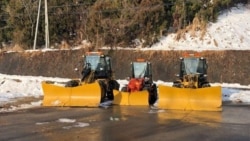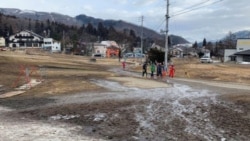Japan has been collecting snow this winter to be used to help cool areas during this year’s Summer Olympics in Tokyo. But lower-than-usual snowfall this year has forced officials to rethink the effort.
Some of the work has taken place in the mountain city of Minami-Uonuma, in Niigata prefecture north of Tokyo. Workers have been trying to collect and store snow to bring by train to areas where Olympic soccer and basketball events will be held.
The snow is supposed to be used to cool buildings. Organizers also plan to give out the snow to Olympic visitors as they arrive for events. Summer temperatures around Tokyo often rise to at least 40 degrees Celsius. Organizers are also planning to use misting machines and water stations to keep Olympic attendees cool.
The use of snow to cool structures is not knew in Japan and some other countries. In Norway, for example, the country’s airport in Oslo uses snow collected and stored during the winter to cool buildings in the summer.
Usually, the mountains in Niigata receive some of the heaviest snow levels in Japan. But this year, snow amounts dropped sharply. They could end up being the lowest since recordkeeping began in 1981. The information on snow levels came from Japan’s Meteorological Agency.
Mutsumi Seki is helping lead snow collection efforts at the Minami-Uonuma project. Seki told Reuters, “We had to change the snow-gathering site from last year to an area where we can expect more snow.”
So far, the city has only collected 1,400 cubic meters of snow. That is lower than the 2,000 cubic meters it collected last year, when it tested the workability of the plan.
Snow depths in areas along the Sea of Japan fell by as much as 15 percent a decade in the years between 1962 and 2016. Those numbers come from a 2018 study by Japan’s Ministry of Environment.
Michael Mann is a professor at Pennsylvania State University. He told Reuters that the climate changes in Japan are “part of a much larger pattern of unusual warmth around the entire Northern Hemisphere this winter.” Mann added that he believes this pattern “is connected to human-caused planetary warming.”
Masami Yashima runs a resort in the city of Nagano, which is next to Niigata. He also said he believes that global warming is causing the drop in snowfall. “There’s very little snow. About a third of what we get here every year,” he said. “It’s very painful.”
Officials in Japan’s northern city of Sapporo are hoping to bring the 2030 Winter Olympics to that city. Sapporo hosted the Winter Olympics back in 1972.
This past December and January, very little snow fell in the area. Then, in early February, it finally arrived. A winter storm dropped about 34 centimeters of snow during a period of just six hours.
Local officials welcomed the snow. But they continue to watch the weather very closely, as they prepare for a possible Olympic award. One weather expert told The Associated Press he thinks the lack of snow – followed by the large amount falling in a short period – may also be a sign that the local climate is changing.
“We often have this kind of event,” said Dr. Tomonori Sato, a professor at Hokkaido University. “However, the magnitude was abnormal. This is maybe because of warming temperatures.”
I’m Bryan Lynn.
Reuters reported on this story. Bryan Lynn adapted the report for VOA Learning English, with additional information from The Associated Press. Ashley Thompson was the editor.
We want to hear from you. Write to us in the Comments section, and visit our Facebook page.
________________________________________________________________
Words in This Story
mist – n. small drops of water that move through the air
site – n. the place where something happens
decade – n. a period of ten years
pattern – n. a particular way something happens
resort – n. a place where people go for vacation
global – adj. involving the entire world
host – v. when a country or city provides the place and equipment for an organized event
magnitude – n. the large size or importance of something








